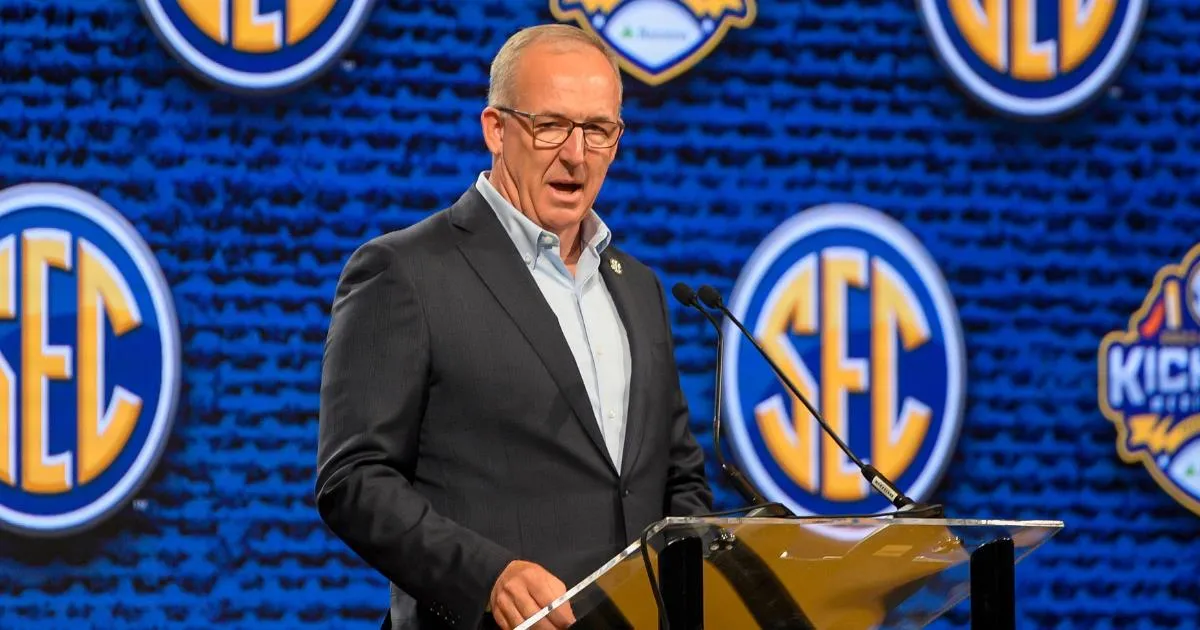
MIRAMAR BEACH, Fla. — During a recent press conference held ahead of the SEC's spring meetings, Greg Sankey, the commissioner of the Southeastern Conference (SEC), found himself responding to challenging questions regarding the future of the College Football Playoff (CFP). Ralph Russo from The Athletic posed a thought-provoking question about the greater good of college football, prompting Sankey to remove his diplomatic gloves and express his views candidly.
Russo's inquiry centered on how the SEC could potentially sacrifice some of its advantages for the broader benefit of college football. This question resonated with Sankey, who had already spent a significant amount of time outlining the urgent need to establish a new playoff format set to debut in 2026. Currently, there is no defined structure for the playoff, leading to discussions about its future. Sankey's response highlighted a defensive stance regarding the SEC's position and track record. “We didn’t need a 12-team playoff. If we’d stayed at four, we would have had half the four last year,” he stated, indicating that he does not appreciate outside commentary on what is best for the game.
Sankey further elaborated on the nature of communications among conference commissioners, particularly regarding a recent unanimous decision to shift to a straight-seeding model for the 2025 College Football Playoff. He pointed out that while some commissioners were issuing press statements, he was genuinely seeking constructive ideas to propel the sport forward. This stark contrast in communication underscores an existing impasse between the SEC and other conferences, particularly the Big Ten, which now dominate the landscape of college football.
While Sankey has not publicly endorsed any specific playoff model, it is clear that both the SEC and Big Ten favor a structure that allocates four spots each in a 16-team field for their leagues. Conversely, the ACC and Big 12 are pushing for a more equitable distribution of spots, advocating for three guaranteed bids each, or at least ensuring no conference receives guaranteed playoff spots beyond its league champions. This ongoing struggle highlights the shifting dynamics of what constitutes a ‘power conference’ in today’s college football environment.
Sankey’s stance on playoff selection criteria has evolved, particularly after witnessing three SEC teams miss out on the inaugural 12-team playoff last season despite impressive records. Earlier this year, Nebraska canceled a home-and-home series with Tennessee for the 2026 and 2027 seasons, a move that Sankey believes reflects the current playoff seeding challenges. He supports the idea that teams benefit from scheduling easier opponents to secure playoff positions, a trend he aims to reverse.
Sankey is poised to advocate for automatic bids for the SEC in the new playoff format, arguing that such changes would not only enhance competitiveness but also encourage teams to maintain tough non-conference schedules. He plans to leverage the SEC's potential willingness to adopt a nine-game conference schedule in exchange for these automatic bids, countering criticisms of the SEC's scheduling practices.
As the landscape of college football continues to evolve, Sankey’s negotiations will play a crucial role in shaping the future of the College Football Playoff. He is expected to present a compelling case to fellow commissioners, highlighting the implications of their decisions on the SEC's scheduling and playoff prospects. Ultimately, Sankey's assertive approach suggests that he is determined to secure a favorable outcome for the SEC, one that could redefine the competitive balance in college football.
In conclusion, as the College Football Playoff discussions progress, the interplay between the SEC, Big Ten, ACC, and Big 12 will be pivotal. The decisions made in the coming months will not only affect these conferences but will also shape the future of college football as a whole.